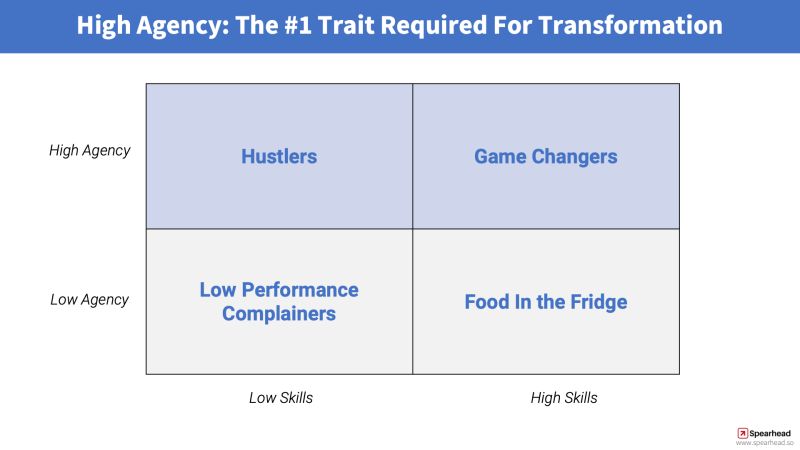High Agency is the number 1 trait we look for hiring at Spearhead.
High agency isn’t just a trait; it’s a transformative force that enables individuals to navigate challenges, seize opportunities, and shape their paths to success. It’s about taking control, making decisions, and acting to achieve desired outcomes, regardless of external circumstances.
To better understand how to use agency to determine top talent, let’s use a quadrant view of agency vs skills:
1. Low Performance Complainers (Low Skills, Low Agency): These individuals often find themselves stuck, blaming external factors for their lack of progress. They struggle to take initiative or improve their skill set, making them less desirable as candidates.
2. Food in the Fridge (High Skill, Low Agency): Highly skilled but lacking the drive to maximize their potential. They may excel in their tasks but often need external motivation to tackle challenges and innovate. It is like food in the fridge, not good enough to eat and not good enough to be thrown out. Though it is eventually thrown out.
3. Hustlers (Low Skill, High Agency): Though they may start with a lower skill level, their high agency propels them to learn, adapt, and overcome obstacles. They’re eager to grow and can be invaluable assets as they develop their skills.
4. Game Changers (High Skill, High Agency): The ideal candidates, possessing both the skills and the drive to excel. They’re self-motivated, innovative, and capable of leading initiatives, making them highly sought after in any field.
As we help our customers to transform, having a talent pool that is High Agency helps us in multiple ways:
a. Adaptability: High agency individuals adapt to change, learn quickly, and find solutions, making them invaluable in fast-paced or uncertain environments.
b. Innovation: They don’t just follow paths; they create them, driving innovation and progress within teams and organizations.
c. Resilience: Their ability to bounce back from setbacks and keep pushing forward ensures that challenges are opportunities for growth, not roadblocks.
d. Leadership: High agency individuals naturally lead by example, inspiring and motivating those around them to strive for excellence.
In conclusion, prioritizing high agency in your hiring process not only enriches your team with individuals who are proactive and resilient but also cultivates a culture of innovation and continuous improvement.
Whether it’s a Hustler eager to learn or a Game Changer ready to lead, recognizing and nurturing high agency can transform potential into excellence.
What are your thoughts on High Agency talent?
#transformation #highperformance #careeradvice #talentmanagement #aitransformations #aitransformation #serviceexcellence
#businesstransformation #innovation

